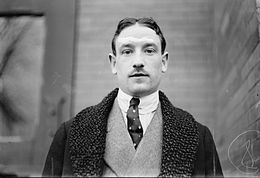André Perchicot

André Perchicot (August 9, 1888 – May 3, 1950) was a French cyclist who won the bronze medal at the 1912 UCI Track Cycling World Championships – Men's Sprint in Newark, New Jersey and the 1912 French National Track Championships.
Biography
He was born on August 9, 1888. In 1912 in Newark, New Jersey the gold medal was won by Frank Louis Kramer. Alfred Grenda of Austria, won the silver medal.[1]
He served in World War I as a pilot and his plane was shot down in 1916. At the end of the war he began a singing career. He travelled the world, touring in Europe, Africa and Middle-East until the late 1930s.[2] He died on May 3, 1950.
References
- ^ "Champion Captures Feature Event from Grenda and Perchicot at Newark Velodrome". The New York Times. September 23, 1912. Retrieved 2010-10-03.
The one-mile double century race, which was won by Frank L. Kramer, was the feature event of the bicycle races yesterday at the Newark Velodrome. After fifteen elimination heats and three semi-finals, Kramer, Alfred Grenda of Australia, and A. Perchicot of France were left to fight out the final, and the contest furnished all that the cycle fans could wish for in the way of spectacular riding.
- ^ "André Perchicot" (in French). Archived from the original on 2010-12-19. Retrieved 2010-10-03.
Il est aussi cycliste. - Sur piste. - Il fut même champion de France de vitesse en 1912. - La même année, il participe à la première course cycliste en Amérique. - À Newark. - Il arrive troisième, derrière Kramer et Grenda. - L'année suivante, il est à Leipzig où il arrive encore troisième, mais au Championnat du Monde de vitesse cette fois-là, derrière Ritt et Ellegard. En '14, il est pilote. Son avion est abattu en 1916. Hospitalisé (blessures aux jambes, au dos, au bassin), il retrouve peu à peu la santé mais comprend qu'il ne fera plus jamais parti du monde du cyclisme. Alors il se lance dans la chanson. D'abord pour remonter le morale des troupes (en milieux hospitaliers) tout en organisant des réunions cyclistes au bénéfice de la Croix Rouge. À la fin de la guerre, il décide de poursuivre cette nouvelle carrière où, en partie grâce à sa réputation de grand cycliste, il devient petit à petit une vedette de la chanson.
